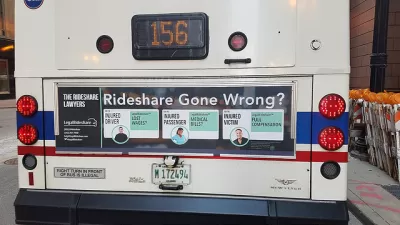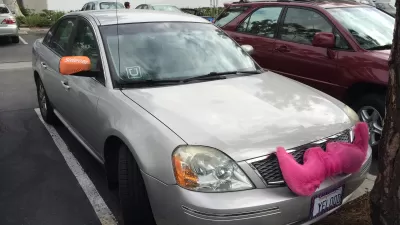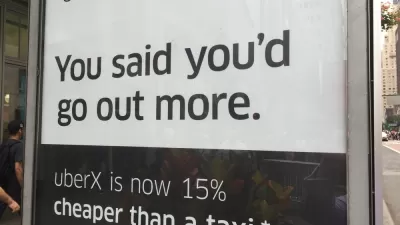A new study predicts the congestion relief benefits of carpooling services offered by Transportation Network Companies. A skeptical audience replies.

"For years, Uber and Lyft have been promising to save the world from traffic jams," reports Marisa Kendall. "A new study suggests they might actually do it."
MIT's Computer Science and Artificial Intelligence Laboratory produced the study, finding that the carpool services transportation network companies make available "could reduce the number of vehicles on the road by 75 percent."
The key is that users actually chose to take shared rides. The shared ride option has gained some traction already, writes Kendall: "In cities where UberPool is available, Uber customers choose the carpool option for 20 percent of trips, according to the ride-hailing company."
The study responds to past studies in San Francisco and New York that make the opposite claim. In New York, the Department of Transportation proposed a cap of the number of TNC vehicles operating in the city, with congestion data backing the proposal. In San Francisco, the Municipal Transportation Agency asked for an environmental review of TNC operations.
Joe Cortright was compelled to write an article casting doubt on the blue-sky scenario described by the MIT study. Cortright calls out several fallacies that contribute to what he calls "uncritical techno-optimism" regarding transportation technology advancements: the fixed demand fallacy, the big data fallacy, and the mathematical model fallacy.
FULL STORY: Study: Uber, Lyft carpool services could reduce traffic by 75 percent

Maui's Vacation Rental Debate Turns Ugly
Verbal attacks, misinformation campaigns and fistfights plague a high-stakes debate to convert thousands of vacation rentals into long-term housing.

Planetizen Federal Action Tracker
A weekly monitor of how Trump’s orders and actions are impacting planners and planning in America.

In Urban Planning, AI Prompting Could be the New Design Thinking
Creativity has long been key to great urban design. What if we see AI as our new creative partner?

Portland Raises Parking Fees to Pay for Street Maintenance
The city is struggling to bridge a massive budget gap at the Bureau of Transportation, which largely depleted its reserves during the Civd-19 pandemic.

Spokane Mayor Introduces Housing Reforms Package
Mayor Lisa Brown’s proposals include deferring or waiving some development fees to encourage more affordable housing development.

Houston Mayor Kills Another Bike Lane
The mayor rejected a proposed bike lane in the Montrose district in keeping with his pledge to maintain car lanes.
Urban Design for Planners 1: Software Tools
This six-course series explores essential urban design concepts using open source software and equips planners with the tools they need to participate fully in the urban design process.
Planning for Universal Design
Learn the tools for implementing Universal Design in planning regulations.
Gallatin County Department of Planning & Community Development
Heyer Gruel & Associates PA
JM Goldson LLC
City of Camden Redevelopment Agency
City of Astoria
Transportation Research & Education Center (TREC) at Portland State University
Jefferson Parish Government
Camden Redevelopment Agency
City of Claremont





























